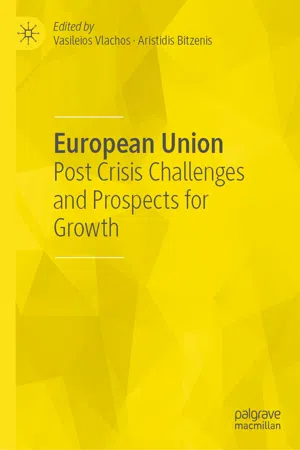
European Union
Post Crisis Challenges and Prospects for Growth
- English
- ePUB (mobile friendly)
- Available on iOS & Android
European Union
Post Crisis Challenges and Prospects for Growth
About this book
This book discusses the unprecedented impact of the financial and economic crisis on government finances and economic performance across Europe, which has raised skepticism on the ability of the current course of integration to promote prosperity. Correspondingly, the European Union is about to contract for the first time in its history. This timely book covers the economic issues that challenge the future of integration in Europe.
The chapters are authored by international experts and examine current and emerging challenges and trends for the European Union: economic convergence, monetary policy, competition law, transport policy, the informal sector, employment, recovery and enlargement. Four chapters focus on Greece, which has been the greatest challenge faced by European institutions in the context of the sovereign debt crisis, and one chapter discusses the possible costs of Brexit. The reader will benefit from understanding the key economic challenges, which, if effectively addressed, will lead to deepening the union, or in contrast to a multi-speed Europe.
Frequently asked questions
- Essential is ideal for learners and professionals who enjoy exploring a wide range of subjects. Access the Essential Library with 800,000+ trusted titles and best-sellers across business, personal growth, and the humanities. Includes unlimited reading time and Standard Read Aloud voice.
- Complete: Perfect for advanced learners and researchers needing full, unrestricted access. Unlock 1.4M+ books across hundreds of subjects, including academic and specialized titles. The Complete Plan also includes advanced features like Premium Read Aloud and Research Assistant.
Please note we cannot support devices running on iOS 13 and Android 7 or earlier. Learn more about using the app.
Information
Evaluating the Prevalence and the Working Conditions of Dependent Self-Employment in the European Union
Table of contents
- Cover
- Front Matter
- Post-crisis Growth Prospects in the European Union
- Convergence Is Alive and Well in Europe
- Unconventional Monetary Policy in the USA and in Europe
- Time to Tidy Up EU Competition Law on Information Exchange Object Restriction Concerted Practices?
- European Union Transport Policy
- Size of the Shadow Economies of 28 European Union Countries from 2003 to 2018
- Evaluating the Prevalence and the Working Conditions of Dependent Self-Employment in the European Union
- Political Economy, Inward Foreign Direct Investment and EU Accession of the Western Balkans
- Greece as a Bridge to the Most Vibrant Region of the Next Decades
- The Third Hellenic Economic Adjustment Program
- The Quality of Domestic Institutions as a Driver for the Initiation of Firms’ Exporting in the EU Post-crisis Period
- Labour Market Duality Under the Insider-Outsider Theory, Labour Division, Rent-Seeking, and Clientelism
- How the Economics Profession Got It Wrong on Brexit
- Back Matter